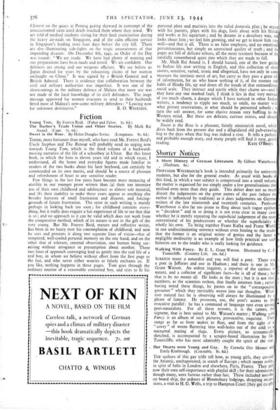Fiction
Young Tom. By Forrest Reid. (Faber and Faber. 75. 6d.)
The Barber's Trade Union and Other Stories. By Mulk Rai Anand. (tape. 7s. 6d.)
Sweet is the Rose. By Helen Douglas Irvine. (Longmans. 8s. 6d.) THOSE, more fortunate than myself, who have read Mr. Forrest Reid's Uncle Stephen and The Retreat will probably need no urging. now towards Young Torn, which is the third volume of a backward- moving narrative of the life of a schoolboy in Ulster. But this latest book, in which the hero is eleven years old and in which recur, I understand, all the home and everyday figures made familiar to readers of the two books about his later boyhood, can certainly be commended on its own merits, and should be a source of pleasure and refreshment of heart to any sensitive reader.
Few things in the last few years have become more menacing of sterility in our younger prose writers than (a) their too intensive use of their own childhood and adolescence as almost sole material, and (b) their inability to make those years appear as anything else besides harvests of small frustration and disaster, and forcing- grounds of future frustration. The error in such writing is mainly perhaps in looking back too soon ; for childhood contains every- thing, but it really does require a fair experience of life to see that that is so ; and no approach to it can be valid which does not work from the comparative method, which of its nature is not in the gift of the very young. But Mr. Forrest Reid, mature and reflective writer, has been in no hurry over his contemplation of childhood, and now he sees and presents it along two separate lines of vision—that of tempered, well-cooled personal memory on the one hand, and on the other that of tolerant, external observation, one human being sur- mising without arrogance or presumption about another. These
two lines of approach converging lead us gently into the real life of a real boy, in whom we believe without effort from the first page to the last, and who never either wearies or falsely enchants us. If you like, nothing happens in these pages. Tom goes through the ordinary routine of a reasonably contented boy, and tries to fit his
personal plots and mutinies into the ruled domestic plan ; he argues with his parents, plays with his dogs fools about with his friends and works at his aquarium ; and he dreams in a desultory way, and looks about him ; we feel him growing, and we get to know him very well—and that is all. There is no false emphasis, and no emotional pretentiousness, but simply an unstrained quality of truth ; and the pages are full of delicate echoes, all the more resonant because of the carefully remembered quiet into which they are made to fall.
Mr. Mulk Raj Anand is, I should hazard, one of the best guides to Indian life now writing in English, and this collection of short stories, sensitive, varied, ironic and allegorical, have not only in some measure the intrinsic merit of art, but carry as they pass a great rift of information, for us who know nothing of it, of the essence and habit of Hindu life, up and down all the treads of that extraordinary social scale. They instruct and startle while they charm us—and if they have any one marked fault, I think it lies in that very menace of too much charm, a danger which I have noticed in other Indian writers, a tendency to ripple too much, to smile, no matter with what private reservations, at what should be presented soberly ; to turn the soft answer, for some elusive reason very baffling to the Western mind. But these are delicate, curious stories, and should
be widely read.
Sweet is the Rose is a pleasant, faintly amateurish novel, which dives back from the present day and a dilapidated old pub-crawling hag to the days when that hag was indeed a rose. It tells a pathetic and probable enough story, and many people will find it easy, gentle






















 Previous page
Previous page